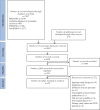Current and Common Definitions of Treatment-Resistant Depression: Findings from a Systematic Review and Qualitative Interviews
- PMID: 30763119
- PMCID: PMC6591751
- DOI: 10.1177/0706743719828965
Current and Common Definitions of Treatment-Resistant Depression: Findings from a Systematic Review and Qualitative Interviews
Abstract
Objective: No universal definition for treatment-resistant depression (TRD) exists. This lack of consensus reduces the generalizability of study findings and limits the ability to study TRD. In addition, anecdotally, there may be a difference between the definitions of TRD within research and those applied in practice. Thus, the objective of this work was to identify current common definitions of TRD used in both research and clinical practice.
Method: A systematic review of published literature was conducted to document TRD definitions. Extracted data were grouped based on patient cohort and method of defining TRD. Validation studies were narratively summarized. Interviews with 6 key informants were conducted to understand how definitions are applied in practice.
Results: In total, 155 definitions for TRD were identified in the published literature, and 48.4% of all definitions specified requirement of at least 2 treatment failures. Key informant interviews indicated the concept of TRD is rarely employed in clinical practice. Instead, concepts like "complex needs," "struggling with their disease," and "chronic" are used. When asked directly about how they would define TRD, interview participants said an adequate trial of psychotherapy as well as an adequate trial of at least 2 to 3 antidepressant medications.
Conclusions: There is no universally accepted definition of TRD, and substantial heterogeneity exists. This study indicates discordance between the use of the term in research and clinical practice, with several key informants emphasizing that the terminology is rarely used in their clinical experience. Development of a shared, common definition across practice and research is required.
Objectif :: Il n’existe aucune définition universelle de la dépression réfractaire au traitement (DRT). Cette absence de consensus réduit la généralisabilité des résultats d’études et limite la capacité d’étudier la DRT. En outre, fait intéressant, il peut y avoir une différence entre les définitions de la DRT utilisées dans la recherche et celles qui sont appliquées à la pratique. Ainsi, l’objectif de ce projet était d’identifier les définitions communes actuelles de la DRT utilisées à la fois en recherche et dans la pratique clinique.
Méthode :: Une revue systématique de la littérature publiée a été menée afin de documenter les définitions de la DRT. Les données extraites ont été groupées selon la cohorte de patients et la méthode de définition de la DRT. Les études de validation étaient résumées narrativement. Les entrevues avec six informateurs clés ont été menées pour comprendre comment les définitions sont appliquées dans la pratique.
Résultats :: Cent cinquante-cinq définitions ont été relevées pour la DRT dans la littérature publiée; 48,4% de toutes les définitions spécifiaient un critère d’au moins deux échecs de traitement. Les entrevues des informateurs clés ont indiqué que le concept de DRT est rarement employé dans la pratique clinique, mais que des concepts comme « des besoins complexes », « en lutte avec leur maladie » et « chronique » sont plutôt utilisés. Lorsqu’on a demandé directement aux participants aux entrevues comment ils définiraient la DRT, ils ont mentionné un essai adéquat de psychothérapie ainsi qu’un essai adéquat d’au moins 2 ou 3 antidépresseurs.
Conclusions :: Il n’y a pas de définition universellement acceptée de la DRT et il existe une hétérogénéité substantielle. Cette étude indique la discordance entre l’emploi du terme en recherche et dans la pratique clinique, et plusieurs informateurs clés soulignent que la terminologie est rarement employée selon leur expérience clinique. L’élaboration d’une définition commune et partagée tant en pratique qu’en recherche est nécessaire.
Keywords: and qualitative interview; mental health; staging models; systematic review; treatment resistant depression.
Conflict of interest statement
Figures




References
-
- Mood and Anxiety Disorders in Canada. Fast facts from the 2014 Survey on Living with Chronic Diseases in Canada. Ottawa (ON): Public Health Agency of Canada; 2014 Available from: http://publications.gc.ca/site/eng/9.629987/publication.html.
-
- Pearson C, Janz T, Ali J. Health at a glance: mental and substance use disorders in Canada Statistics Canada, Health Statistics Division; 2013.
-
- Fostick L, Silberman A, Beckman M, et al. The economic impact of depression: resistance or severity? Eur Neuropsychopharmacol. 2010;20(10):671–675. - PubMed
-
- Stimmel GL. Economic grand rounds: the economic burden of bipolar disorder. Psychiatr Serv. 2004;55(2):117–118. - PubMed
-
- Rush AJ, Trivedi M, Wisniewski SR, et al. Acute and longer-term outcomes in depressed outpatients requiring one or several treatment steps: a STAR*D report. Am J Psychiatry. 2006;163(11):1905–1917. - PubMed
Publication types
MeSH terms
LinkOut - more resources
Full Text Sources
Medical

